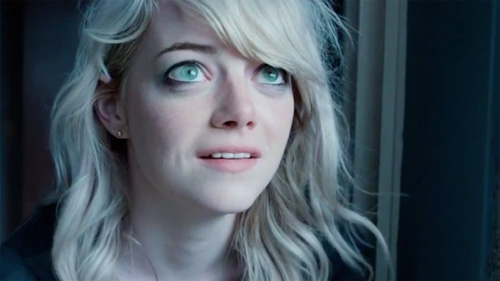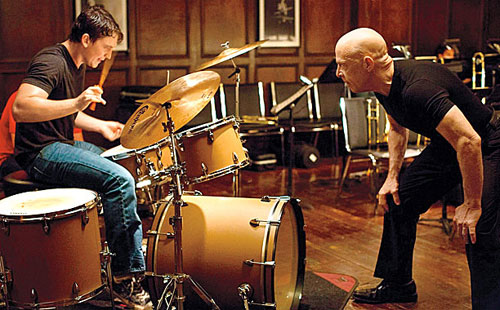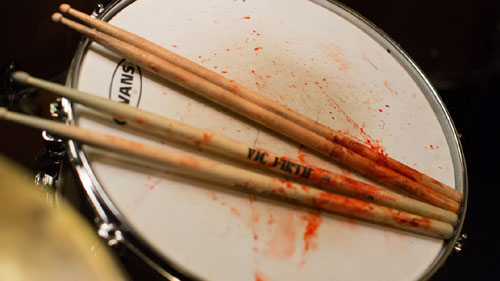|
Movie theaters across America resounded to the beat of drums this fall, thanks to Alejandro Gonzalez Inarritu’s Birdman and Damien Chazelle’s Whiplash. In Birdman, a Broadway street performer, seen only in passing, provides the drumbeats accompanying the efforts of fading star Riggan Thomson (Michael Keaton) to resurrect his career. Though it’s difficult to imagine a higher-pressure situation than Birdman, Whiplash presents one, portraying the efforts of aspiring jazz drummer Andrew Neyman (Miles Teller), a student at a prestigious music school, to get in the good graces of choleric teacher Terence Fletcher (J.K. Simmons). Birdman is the more ambitious of the two films, Whiplash the more concentrated, but both get an audience’s adrenaline pumping more than the last dozen superhero movies combined.
Inarritu is famous for complex, multi-character films such as Amores Perros, 21 Grams, Babel and Biutiful. These films were notably mournful in tone, each with a slight, wistful note of hopefulness at the end. Birdman, the most intricate of all Inarritu’s films, contains many laughs, but I hesitate to call it a comedy. A lot of funny things happen to Thomson—especially the scene, well-represented in the film’s trailer and commercials, in which Thomson is locked out of his theater clad only in socks and jockey shorts, and is forced to run a gauntlet of paparazzi and autograph hounds. But the film’s humor is borne of an atmosphere combining unbearable tension with a sense of impending doom.
Famous for playing a superhero called Birdman in the first three films of that name, Thomson is directing and starring in his own stage adaptation of a Raymond Carver story—as far away from a superhero fantasy as he can get. The previews are doing good business, thanks to Thomson’s name on the marquee, but his efforts are met with a combination of incomprehension and hostility. The incomprehension can be encapsulated by a press interview during which Thomson begins to explain why he didn’t make Birdman 4. An Asian journalist literally jumps for joy. “Birdman 4!” he exclaims. “You made Birdman 4?” The hostility is represented by Tabitha Dickinson (Lindsay Duncan), an evil theater critic for the New York Times (has any film ever portrayed a nice critic?), who tells Thomson she plans to bury the play before she’s even seen it.
When one of the actors has an accident (or is it an accident?) with a falling stage light, Thomson and his lawyer/manager Jake (Zach Galifinakis) conduct a frenzied search for a replacement—complete with a list of real-life stars, most of whom are said to be unavailable because they’re making superhero movies. Finally, leading lady Lesley (Naomi Watts) tells Thomson that the erratic but brilliant Mike Shiner (Edward Norton) is available. How does she know? “We share a vagina,” she says.
So Thomson hires Shiner, and the leap from frying pan to fire is complete. Shiner is an egomaniacal, solipsistic wild man who does not hesitate to commit any despicable act to advance the thespian art as he perceives it. Going out of character and ripping up the set during a preview performance? Check. Appropriating Thomson’s thoughts about the play as his own for a newspaper interview? Check. Attempting to have real sex with Lesley on stage during a bedroom scene? Double- and triple-check.
Thomson’s problems don’t end with Shiner. Sam (Emma Stone), Thomson’s just-out-of-rehab daughter now acting as his assistant, seethes with old resentments against her father. Laura (Andrea Riseborough), another actor in the play, may or may not be carrying Thomson’s child. Sylvia (Amy Ryan), Thomson’s ex-wife, is the film’s main voice of reason; yet Thomson is upset by her presence, underlining as it does his multiple failures as husband, father, and actor.
 |
For most of its running time, Birdman is an absolute marvel. With the invaluable help of editors Douglas Crise and Stephen Mirrione, cinematographer Emmanuel Lubezki and production designer Kevin Thompson, Inarritu takes us into the guts of the theatrical experience, the camera following Thomson & Co. through Thomson’s constricted world: the dim auditorium, dingy hallways, dingier dressing rooms, and dingiest basement storerooms of the theater, out into the street and the bar next door. The whole thing is edited, magnificently, to look like one continuous take. (Birdman reminded me of other one-take experiments in cinematic history, from Hitchcock’s Rope to Alexander Sokurov’s little-known but breathtaking Russian Ark.)
The frenetic solos of drummer Antonio Sanchez drive the cast through their hypertensive maze, letting up occasionally for flourishes from Tchaikovsky, Ravel or Rachmaninov that underscore the characters’ most revelatory moments. Under Inarritu’s direction, this cast has many revelatory moments. Much has been made of the similarity between the resumes of Riggan Thomson and Michael Keaton, and only slightly less of how the character of Mike Shiner plays off Edward Norton’s real-life reputation for being a pain in the ass. All I can say is that Keaton and Norton do some of the best, most intense work of their lives here, going at each other like cage fighters on Benzedrine. Birdman, of course, is mostly Keaton’s show, and his close-ups amount to a bravura display of conflicting emotions—egotism and self-doubt, elation and despair. The entire cast performs at that level; I was especially impressed by Stone, who is better here by a multiple of ten than in anything else I’ve seen her.
Unfortunately, Birdman loses steam in its last half-hour. Inarritu queues us from the film’s first moment that his film will have a big, fat strain of magic realism. Once he fully introduces that magic realism, however, the story and the characters become less interesting. Apparently Inarritu wanted to achieve the same delicate balance of queasiness and exaltation that his friend Guillermo Del Toro created in his masterpiece, Pan’s Labyrinth. However, the queasiness toward the end of Birdman outweighs any possible exaltation, sapping (but fortunately not quite destroying) the mordant energy of one of the best show-biz satires ever filmed.
Whiplash, on the other hand, remains totally on-key from beginning to end, never letting up. Director-writer Chazelle, cinematographer Sharone Meir, editor Tom Cross and composer Justin Hurwitz maintain a breakneck pace throughout the film, as tense and punishing as one of Andrew Neyman’s solos—or, more to the point, one of Terence Fletcher’s rehearsals.
 |
Fletcher is an SOB to end all SOBs. He is Professor Kingsfield in The Paper Chase, multiplied by the drill sergeant in Full Metal Jacket, multiplied by J.J. Hunsecker in Sweet Smell of Success, multiplied by the Phantom of the Opera. His favorite story—which he tells often—is the one about Jo Jones throwing a cymbal at the young Charlie Parker after a botched solo. He says this motivated Parker to practice hard enough to become the best sax player ever. Watching Fletcher in action, however, we suspect he really loves the story for the license it gives him to bully his young charges.
He bellows obscenities at them, throws chairs at them, slaps their faces, makes them practice drum solos until blood soaks their sticks and drum kits—all in the service of attaining his nearly unattainable standards of excellence.
 |
“The worst thing you can tell anybody,” Fletcher also says, “is, ‘Good job.’” In a sense, he is certainly right: to be satisfied with mediocrity is to cheat both your students and your art. Yet, seeing how he abuses his students, we wonder if the price of excellence is worth it, or if Fletcher’s way is the only way to mastery.
That is something Andrew Neyman doesn’t wonder about. To him, becoming the next Buddy Rich is the only goal in life, and becoming Fletcher’s pet student is the only way to achieve it. Andrew himself is an odd duck—obsessive, anti-social, virtually friendless. He dates a nice, devoted young woman (Melissa Benoist), then dumps her, on the assumption that he’s saving her the trouble of dumping him. His father Jim (Paul Reiser), a high-school teacher and failed writer, is indulgent toward his son, but the rest of his extended family hates his arrogant guts.
Yet Andrew is not only prepared but eager to debase himself before Fletcher, who in turn is more than eager to debase Andrew. He pushes Andrew to the limit, working him half to death and playing him against the other candidates for first-chair drummer in the student jazz orchestra. There is a harrowing sequence about the comedy of errors—soon turning into a tragedy of errors—surrounding Andrew’s efforts to get to an auditorium where the orchestra is performing in competition. But even that pales next to the final scenes, in which Fletcher—having ostensibly shown a softer side—turns out to be even worse than we imagined. Andrew must use his wits and talent to save himself from permanent, career-killing humiliation.
The jazz score, featuring both new pieces and classics such as Duke Ellington’s “Caravan,” is a knockout, but it is Simmons and Teller you will remember. For two decades Simmons has been ubiquitous. He has had notable roles in Oz, Juno, the various Law and Order franchises and the Tobey Maguire Spider-Man movies, though most people probably know him as the guy in the Farmers’ Insurance commercials. Whiplash is his opportunity to reveal himself as a major actor, and to say he takes full advantage of it is an understatement. Glowering at his students like a malevolent tortoise, Simmons’ Fletcher radiates a charisma that makes it plain why he gets away with his predations. Toscanini couldn’t have been so authoritative.
Similarly, our hearts ache for Teller, even as we cringe at his behavior. Music is all Teller’s Andrew has; he has no family, no friend, no love except that. His desperate need to break through in the music world, with Fletcher as the implacable gatekeeper, is horrifying and heartbreaking. In light of the sado-masochistic co-dependency that develops between Fletcher and Andrew, it is impossible to see the end of Whiplash as the triumph it would be in any other movie. The match made in Hell is completed, and Satan celebrates by playing the greatest solo anyone ever heard.
|